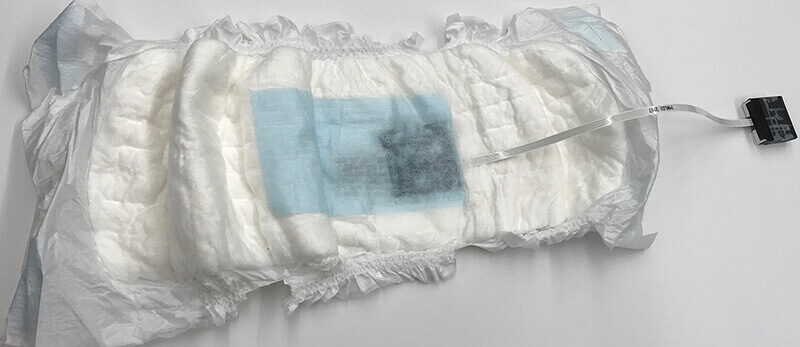June 24, 2019
Autonomous diaper sensor better detects urinary tract infection
WEST LAFAYETTE, Ind. — Urinary tract infections are the second most common type of infection in children, with ear infections taking first place.
Responsible for nearly 10 million doctor visits each year in the U.S., urinary tract infections can also be a major source of additional disease, particularly for elderly people.
Purdue University researchers have come up with a way to embed an autonomous sensor device in diapers to better detect UTIs. The disposable device has been tested and proven to accurately detect the infection, as seen in this video: https://youtu.be/0AWnGW0XEas.
While treatable with antibiotics, checking for UTI at the doctor’s office typically involves testing a urine sample for bacteria and blood cells. These samples are hard to collect in individuals who wear diapers.
 A disposable diaper sensor can continuously track the presence of urinary tract infection, leading to earlier treatment. (Purdue University image)
Download image
A disposable diaper sensor can continuously track the presence of urinary tract infection, leading to earlier treatment. (Purdue University image)
Download image
“We have at least two big advantages here with our device,” said Babak Ziaie, a professor of electrical and computer engineering at Purdue. “Because it’s autonomous, it doesn’t require the patient or caregiver to obtain urine samples, and it can help detect an infection in people who either aren’t able to communicate their symptoms, or they don’t show typical symptoms.”
UTIs develop when bacteria get into the urinary tract and multiply, leading to redness and pain in the urinary tract. Some typical symptoms include an urgent need to urinate, a burning feeling when using the bathroom and a strong odor to the urine. The infection can easily spread to the kidneys and become more severe.
The bandage-sized sensor is self-powered. Once exposed to urine, the battery provides power to the sensor circuitry. The sensor checks for nitrites, chemical compounds commonly associated with urinary tract infections, and wirelessly sends the results via a smartphone to the patient, caregiver, and/or health care network if required.
Purdue researchers tested the prototype with synthetic urine samples. Testing has shown the prototype to be more accurate than commercial dipsticks.
“The autonomous feature improves accuracy because it checks for UTIs on a regular basis, increasing the amount of data. It can also track changes in the status of UTIs over time,” said Byunghoo Jung, a Purdue professor of electrical and computer engineering who worked with Ziaie on this technology.
The researchers worked with the Purdue Research Foundation Office of Technology Commercialization to patent the technology. The research team is looking for additional partners and those interested in licensing the technology.
More information on the diaper-embedded sensor is available in a paper published in the journal IEEE Transactions on Biomedical Circuits and Systems.
Their work aligns with Purdue's Giant Leaps celebration, acknowledging global advancements in health as part of Purdue’s 150th anniversary. It is one of the four themes of the yearlong celebration’s Ideas Festival, designed to showcase Purdue as an intellectual center solving real-world issues.
About Purdue Office of Technology Commercialization
The Purdue Office of Technology Commercialization operates one of the most comprehensive technology transfer programs among leading research universities in the U.S. Services provided by this office support the economic development initiatives of Purdue University and benefit the university's academic activities. The office is managed by the Purdue Research Foundation, which received the 2016 Innovation and Economic Prosperity Universities Award for Innovation from the Association of Public and Land-grant Universities. For more information about funding and investment opportunities in startups based on a Purdue innovation, contact the Purdue Foundry at foundry@prf.org. For more information on licensing a Purdue innovation, contact the Office of Technology Commercialization at otcip@prf.org and reference 2014-ZIAI-66713. The Purdue Research Foundation is a private, nonprofit foundation created to advance the mission of Purdue University.
Media contact: Kayla Wiles, 765-494-2432, wiles5@purdue.edu
Writer: Chris Adam
Sources: Babak Ziaie, 765-494-0725, bziaie@purdue.edu
Byunghoo Jung, 765-494-2866, jungb@purdue.edu
Note to Journalists: A YouTube video is available at https://youtu.be/0AWnGW0XEas. Other multimedia can be found in a Google Drive folder at http://bit.ly/ziaie-media. The materials were prepared by Erin Easterling, digital producer for the Purdue College of Engineering, 765-496-3388, easterling@purdue.edu.

